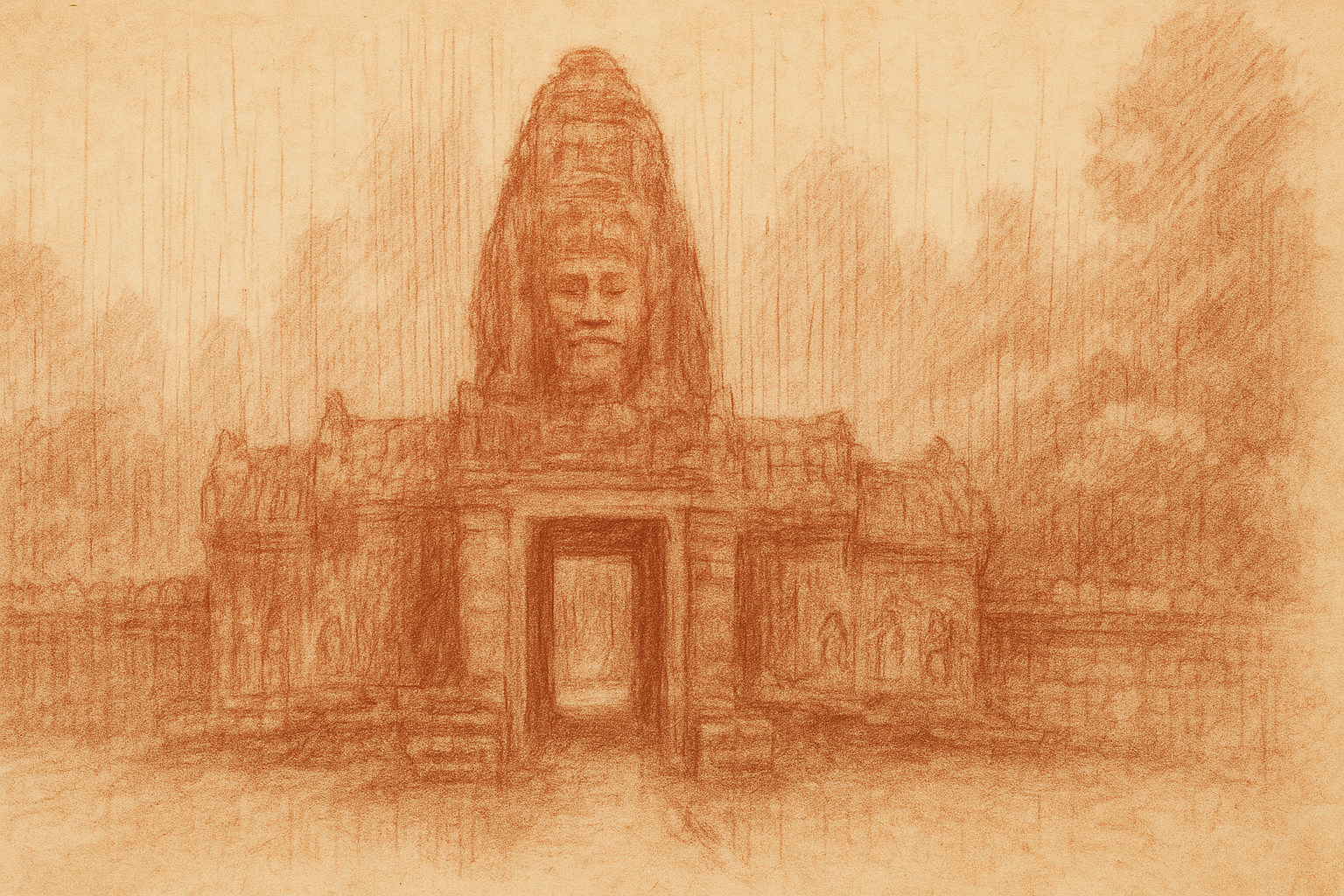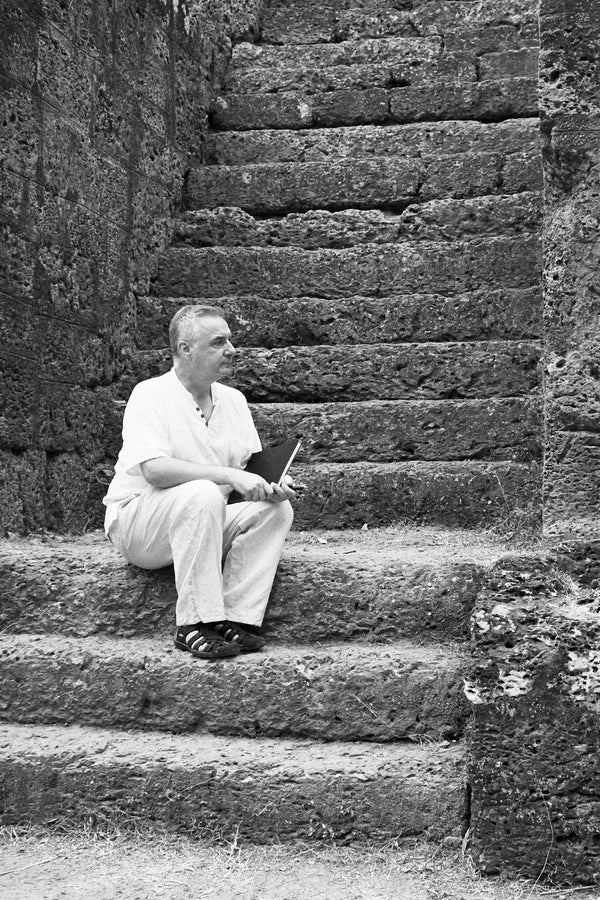Complimentary worldwide shipping on orders over $400 · No import tariffs for most countries
Complimentary worldwide shipping on orders over $400 · No import tariffs for most countries

The Rain That Softens Time
He who walks slowly in the rain
hears more clearly
what the stone remembers.
The rain was still falling when we arrived at the northern gate. Not a hesitant drizzle, but a steady monsoon hush—weightless yet complete, like a ritual whispered by the sky. It did not mourn. It offered. A solemn rhythm, as if the clouds themselves had come to kneel before the stone.
We lingered beneath the great trees at the northern gopura of Banteay Kdei. Their trunks were robed in moss, their roots curled like memory made flesh—hands of the forest, cradling what remains. This gate lies just off the pilgrim’s way, passed by many, chosen by few. I too had walked past it, too many times without hearing its call. But this morning, in the quiet blessing of rain and the hush of absent footsteps, the path turned inward.
I ducked beneath low boughs to shield the paper. The chalk rested between my fingers like a prayer not yet spoken. I did not seek the form—I waited for it to reveal itself. The gate rose through the mist, blurred and consecrated. The Bayon face smiled through water-veiled air: not with grandeur, but with secret joy. The galleries stretched like wings. And in the hollowed stone, time pooled—not broken, but deepened.

The face watches still
through leaves and sky and rainfall—
a silence with eyes.
We passed beneath the gopura. Water streamed from stone in sacred rivulets. And there—poised in that inward threshold—stood a Garuda. Wings half-lifted, beak raised, his body sheathed in moss and the silence of centuries. A guardian in flight, caught not by force, but reverence. My hood was soaked through. My sketchbook trembled. The chalk moved—not to impose, but to receive.

Garuda at the Northern Gate
Wings unfurled, beak lifted, he waits in the vine-laced silence—moss and shadow cloaking his flight, mid-motion through stone and rain.
The path narrowed southward into the forest. The rain had softened the world, made it tender. The moat, once wide with water, now lay choked in grasses. The cattle had gone. The road remembered older feet. We stepped carefully, the earth breathing beneath us, vines pressing through stone, the jungle offering back its breath.
This was the way not often taken.
Altars lay open to the sky. Terraces had begun to forget their shape. And ahead, the western gopura stood—its scaffolds laced with rust, its silence propped by time.
We turned west. The clouds thinned to ash. Beyond a collapsed wall, the gopura of the third enclosure rose—closed to passage, but open to spirit. And beside it rose a vast spung tree, rooted deep into the ruin’s heart. Not an invader, but kin. Its arms reached skyward like a supplication, its roots enfolding the gopura in something tender and immense.
I found rest upon the terrace. The naga balustrades lay fractured, like the ribs of a god once sung. The stone drank the rain. The apsaras along the outer walls shimmered in their veils of water. Some smiled, as though remembering a long-forgotten joke. Others had no faces left—only the memory of being seen. One bore a scar where the earth had shifted, cleaving her in two. Yet even in her fracture, she remained whole.

Western Terrace and Gopura
Rain-darkened stone, naga balustrades broken like old ribs, and a spung tree embracing the gopura—an offering of time rooted in ruin.
We wandered through the western galleries and hollowed courts. The rain blurred breath and boundary. The air was thick with the taste of age. Here, the stone was not stone—it was presence. The devatas leaned from their niches, half-smiling, their lips worn soft by centuries of touch and sky.
No foundation stele has ever been found at Banteay Kdei. But the proportions whisper it clearly: this temple belongs to the triad of compassion. Jayavarman VII once dreamed in sacred symmetry—Prajnaparamita at Ta Prohm, Lokeshvara at Preah Khan, and here—the Buddha. Not enthroned, but walking. Not distant, but near. In these pediments, he is not yet renunciant. He is still Siddhartha—the prince before the parting.
In 2001, archaeologists unearthed 274 broken fragments—heads, hands, torsos, limbs—many once part of seated Buddhas. Scattered, not destroyed. Laid side by side in solemn array. Some say it was monks who gathered them, in the long night of Shiva’s return. It was not an act of despair, but devotion. A vigil.
To bury a broken god
is not to give up the light.
It is to guard its silence.
I stopped before a ruined portico. Rain slipped from the stone above. A dvarapala stood beside it—sword low, gaze unwavering, moss tracing the edges of his face like time’s gentle hand. The guardian to the right had softened, serene. But this one—left-hand sentinel—was fierce, unyielding. My hands were wet. The chalk blurred. But the line still came. Not precise. Remembered.

Dvarapala of the Inner Enclosure
Sword lowered, gaze unblinking, the guardian stands veiled in moss—a fierce and holy figure carved to outlast forgetting.
Further on, a pediment still held the Buddha in royal ease, his form circled by worn-faced devotees. Beneath him rose rakshasa warriors—half-clawed, half-falling. On another lintel, he sat above a kala, unmoved by time’s devouring grin. And then, a rare scene: the Royal Contest. The prince’s horse reared. Another rider lay fallen. A woman watched, carved in stillness.
It is said Siddhartha did not conquer the horse.
He whispered to it.
He placed a hand upon its flank
and offered stillness.
The horse listened.
He mounted.
There was no triumph—only trust.
The rain grew gentler.
Everything was soaked. The paper sagged. The chalk wore thin. But the jungle glistened. The scent of bark, of earth, of wet stone lingered like incense. We turned back the way we had come. Through the same gate. Past the same trees. But slower now. Steeped in something holy.
We did not speak.
We listened.
—
Sometimes, the gods arrive not in thunder,
but when the paper is wet,
and the hand does not tremble.
Sanctuary of Quiet Offerings
Photographs from Banteay Kdei – Spirit of Angkor series by Lucas Varro
Banteay Kdei is a temple of worn thresholds and whispered prayers—a place where the sacred does not announce itself, but lingers softly in the shadows. Built on hallowed ground and long wrapped in silence, it is one of Angkor’s most intimate sanctuaries. Time has weathered its stones into gestures of grace, and through its fallen lintels and leaning walls, light slips in like breath through cupped hands.
In this contemplative collection from the Spirit of Angkor series, Lucas Varro returns to Banteay Kdei with the patience of a pilgrim. Each photograph was made with large or medium format black-and-white film, shaped by long exposure, chiaroscuro, and the artist’s own hand-toning process. These are not images of decay—but of devotion. Moments of stillness revealed in the company of stone.
Printed on museum-grade Hahnemühle Bamboo paper in limited editions, each work is accompanied by a Collector’s Print Package that includes poetic writings, curatorial notes, and reflections from the artist’s daily wanderings through the temple’s sacred ruin.
This is Banteay Kdei not as a monument, but as a hush—a quiet offering held open to the light.
Join My Studio Journal
Receive occasional letters from my studio in Siem Reap—offering a glimpse into my creative process, early access to new fine art prints, field notes from the temples of Angkor, exhibition announcements, and reflections on beauty, impermanence, and the spirit of place.
No noise. No clutter. Just quiet inspiration, delivered gently.
Subscribe and stay connected to the unfolding story.

Join My Studio Journal
Receive occasional letters from my studio in Siem Reap—offering a glimpse into my creative process, early access to new fine art prints, field notes from the temples of Angkor, exhibition announcements, and reflections on beauty, impermanence, and the spirit of place.
No noise. No clutter. Just quiet inspiration, delivered gently.
Subscribe and stay connected to the unfolding story.











